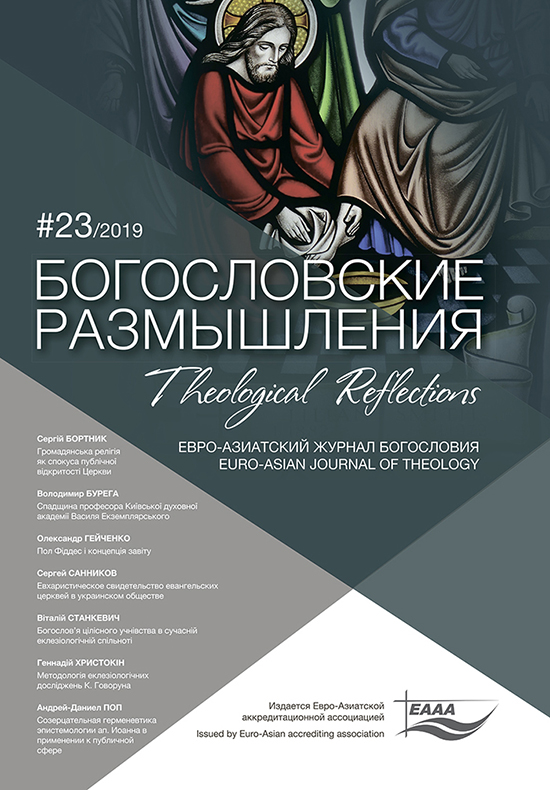Contemplative Hermeneutics on John’s Epistemology Applied in the Public Square in the Context of Romanian Pentecostalism
DOI:
https://doi.org/10.29357/2521-179X.2019.23.07Keywords:
contemplative hermeneutics, directive hermeneutics, epistemology, public square, Gospel, “I am” statements.Abstract
Starting from the reality of Romanian evangelical churches where most of the sermons and Bible messages are directive, which reflect a hermeneutic of the same type (only directives, indications and recommendations are usually presented), we can see that it is necessary to elaborate a comparative study in the domain of practical and public theology, which will show the clear superiority of contemplative hermeneutics which is concentrated on God’s person. In other words, I propose a demonstration of the fact that a contemplative hermeneutics is more efficient than a directive hermeneutics for Romanian Pentecostalism and for the way the message of the Gospel is addressed in the public square. Our love in action can be seen in the public square by our proclamation, and for a proper proclamation we need a proper hermeneutic, and in my opinion this one is the contemplative hermeneutic. The reason for choosing John’s epistemology through the statements “I am” to prove the superiority of contemplative hermeneutics, is the fact that John`s perspective offers a complex contemplative (epistemological) picture of the person of Jesus Christ. In the final part of my writing I want to demonstrate that the application of contemplative hermeneutics is actually a homiletics in the same way, and in this homiletics Christ is the center of the message, and not a collection of rules and interdictions reflected by a directive hermeneutics. I consider that through this approach the message of the Church in the Public Square is full of substantial content, which can make a difference in the context of a secularized society on the one hand, and on the other hand a society characterized by the post-modern thinking, in which experience is –-very important, and contemplative hermeneutics offers the chance to experience the power of the Gospel in the public square and also at an individual level.
References
- Audi, Robert. Epistemology: A Contemporary Introduction to the Theory of Knowledge, Routledge Contemporary Introductions to Philosophy. London: Routledge, 1998.
- Barclay, William. The Promise of the Spirit. London: Epworth Press, 1960.
- Barth, Karl. Church Dogmatics. Volume I, Part 1: The Doctrine of the Word of God. Edinburgh: T. & T. Clark, 1936.
- Bassler, Jouette M. “Mixed Signals: Nicodemus in the Fourth Gospel.” Journal of Biblical Literature 108, no. 4 (1989): 635.
- Billings, Todd. The Word of God for the People of God: An Entryway to the Theological Interpretation of Scripture. Grand Rapids: Eerdmans, 2010.
- Bedford-Strohm, Heinrich. “Poverty and Public Theology: Advocacy of the Church in Pluralistic Society.” International Journal of Public Theology 2, no. 2 (2008): 144–62.
- Broughton, Geoff, “Restorative Justice, Opportunities for Christian Engagement.” International Journal of Public Theology 3, no. 2 (2009): 299-318
- Burge, Gary M. John, The NIV Application Commentary. Grand Rapids: Zondervan, 2000.
- Chapell, Bryan. Christ-Centered Preaching: Redeeming the Expository Sermon. 2nd ed. Grand Rapids: Baker Academic, 2005.
- Clarke, Adam, John – Acts, Clarke`s Commentary NT, vol. 5B. Chicago: Books for the Ages, 1997.
- Carson, D.A. “The Function of the Paraclete in John 16:7-11.” Journal of Biblical Literature 98, no. 4 (1979): 547-566.
- Edwards, Mark. John through the Centuries. Blackwell Bible Commentaries. Oxford: Blackwell Publishing, 2004.
- Langston, Scott M. Exodus through the Centuries. Blackwell Bible Commentaries. Oxford: Blackwell Publishing, 2006.
- Graham, Elaine. “How to Speak of God? Toward a Post-secular Apologetics.” Practical Theology 11, (2018):1-12.
- Keating, James, “Contemplative Homiletics, Being Carried into Reality.” Nova et vetera, vol. 17, (2019): 1-13.
- Merton, Thomas. “Contemplation and Social Transformation: The Example of Thomas Merton. ” Acta Theologica 23, no. 1 (2016): 185.
- Maggay, Melba. “Confronting the Powers” in Holistic Mission God’s Plan for God’s People. Eds. Brain Woolnough and Wonsuk Ma, Oxford: Regnum, 2010.
- McGrath, Alister E. The Science of God: An Introduction to Scientific Theology. London: T. & T. Clark, 2004.
- Michaels, J. Ramsey. The Gospel of John, The New International Commentary on the New Testament. Grand Rapids: Eerdmans, 2010.
- Raymond, George and Murray, Beasley. John, 2nd ed., Word Biblical Commentary. Nashville: Thomas Nelson, 1999.
- Roberts, Richard H. Religion, Theology and the Human Sciences. Cambridge: Cambridge University Press, 2004.
- Stackhouse, Max, “Public Theology and Ethical Judgment.” Theology Today 54, (1997): 165- 179.
- ______, “Reflections on How and Why We Go Public”, International Journal of Public Theology 1, (2007): 421-430.
- Stibble, Mark W.G. John`s Gospel. London: Routledge, 1994.
- Tracy, David. “Three Kinds of Publicness in Public theology.” International Journal of Public Theology 8, (2014): 330-334.
- Vanhoozer, Kevin. First Theology: God, Scripture and Hermeneutics. Downers Grove: Inter Varsity Press, 2002.
- Wright, Christopher. Mission of God’s People. Grand Rapids: Zondervan, 2010.
Downloads
How to Cite
Issue
Section
License
Copyright (c) 2020 Andrei-Daniel POP

This work is licensed under a Creative Commons Attribution-NonCommercial 4.0 International License.
All articles published in the Journal are distributed under a Creative Commons Attribution-NonCommercial 4.0 International License
By submitting an article for publication in Theological Reflections: Eastern European Journal of Theology the author grants the editors the right to publish the article and distribute it in electronic and print form.
The author reserves all copyrights and the right to use the materials of the article in whole or in part for educational purposes, to write his own dissertations, to prepare abstracts, conference reports, oral presentations, etc., as well as post electronic copies of articles (including the final electronic version downloaded from the journal’s official website) on non-commercial web-resources without the consent of the editorial board and founders.



